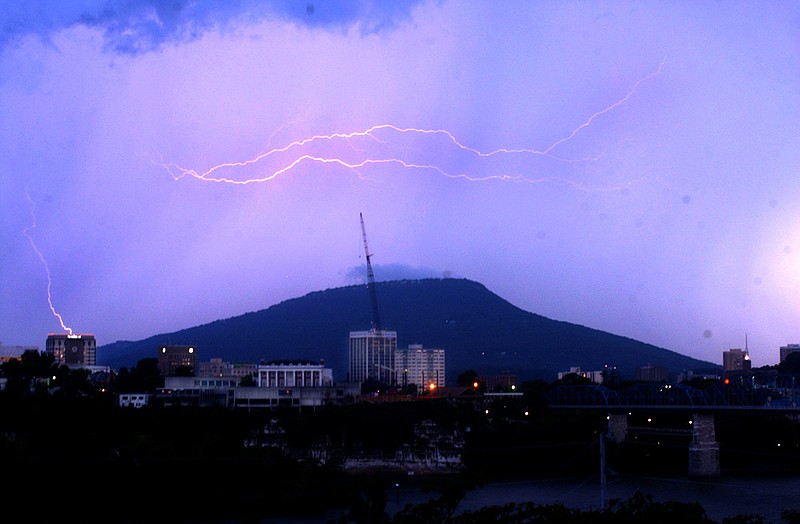ATLANTA - He was fishing with his two young sons when Egan Blain Stanley was struck by lightning on July 4. Four days later, the 37-year-old died at Grady Memorial Hospital.
The Dalton, Georgia resident became the 12th person killed by lightning this year in the U.S.
On July 10, a Florida man also was killed by lightning, and on July 12, an Alabama woman died two weeks after being struck. This year's total of 15 deaths is just shy of the 2017 total of 16 deaths, and hundreds of others were injured last year, according to the National Weather Service.
For Tennessee, it's been an especially deadly year. With three so far, that's more than the total from 2008-2017, which was one. The most recent death was Somerville resident Darrell Hoskins on July 21.
And meteorologists warn there are still plenty of summer storms on the way.
BY THE NUMBERS
2018 LIGHTNING DEATHS(as of July 19)Florida: 6Tennessee:3Arkansas: 2Alabama: 1Georgia: 1Texas: 1Minnesota: 1Source: National Weather Service2008-2017 LIGHTNING DEATHSAlabama: 15Georgia: 8Tennessee: 1Source: National Weather Service
"What happens is, typically in the summertime, we get thunderstorms, and they are pop-up," said Paul Barys, chief meteorologist for WRCB-TV News Channel 3. "They're usually scattered. They don't last that long, usually, and sometimes even before the rain starts, you'll hear a clap of thunder."
Think you have a better chance of winning the lottery than getting struck by lightning? Not so, according to statistics from the National Weather Service and the Powerball lottery. There is a 1 in 14,600 chance of being struck by lightning during a lifetime, according to the NWS. Rather win the Powerball grand prize? The chance of that is 1 in 292,201,338.
Lightning is one of the top storm-related causes of death, coming in behind tornadoes and hurricanes, the NWS says. Lightning strikes were responsible for 40 deaths in 2016, but have declined over a 10-year period, data showed. The average number of deaths a year since 2008 is 28, and June, July and August are when lightning is most likely to kill someone.
"Cardiac arrest is the immediate cause of death for those who die," according to the National Weather Service. "Lightning victims do not carry an electrical charge and may need first aid immediately."
Sometimes lightning will strike even before rain can be picked up on a weather radar, Barys said. That is because the storm is still building.
STAYING SAFE DURING LIGHTNING
1. If you hear thunder, lightning is close enough to strike you.2. When you hear thunder, immediately move to safe shelter: a substantial building with electricity or plumbing or an enclosed, metal-topped vehicle with windows up.3. Stay in safe shelter at least 30 minutes after you hear the last sound of thunder.4. If you’re inside, stay off electrical equipment that puts you in direct contact with electricity and stay away from windows and doors. Avoid sinks, baths and faucets.5. If you’re caught outside with no safe shelter, get off elevated areas and never shelter under a tree. Immediately get out and away from ponds, lakes and other bodies of water. Stay away from objects that conduct electricity, such as barbed wire or power lines.Source: National Weather Service
"So that surprises people, and if you haven't heard any thunder, you just get hit by a lightning strike, you can't blame anybody for that," Barys said.
But once a storm is about two miles away, thunder can be heard, he said, and people should seek shelter immediately.
"Once you hear that thunder, you're within range of getting hit by it," he said. "Lightning can move, sometimes, quite a distance."
In many cases, people struck by lightning are working outside, mowing the lawn or doing house repairs. Other times, such as with Stanley, the hot temperatures bring people outside for recreation. Some people have been struck while trying to get inside during storms.
During the summer of 2010, two metro Atlanta teenagers died within two weeks after being struck by lightning in separate incidents.
In July 2010, cousins Chaquille Hunter and Theresa Seabrum were walking home from a friend's Cobb County, Georgia, apartment when lightning struck a nearby tree and the teenagers. Chaquille, 16, died from her injuries and Theresa, 14, was critically injured. Two weeks earlier, a Henry County 14-year-old died after being struck while standing under a tree in his neighborhood.
If people are outside and hear thunder, "it's time to quit," Barys said. "Move inside, get in a car. And never, ever stand under a tree."
The Atlanta Journal-Constitution contributed to this story.
